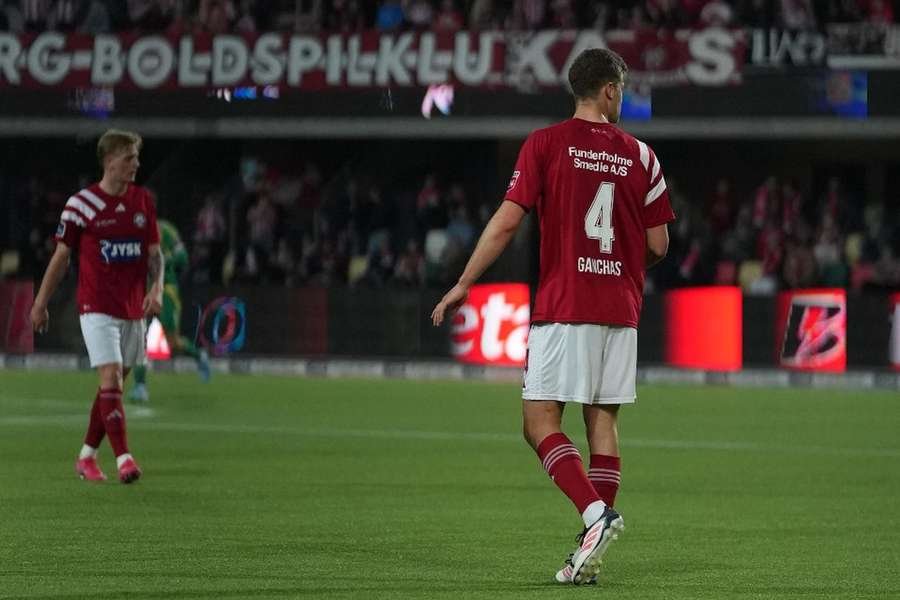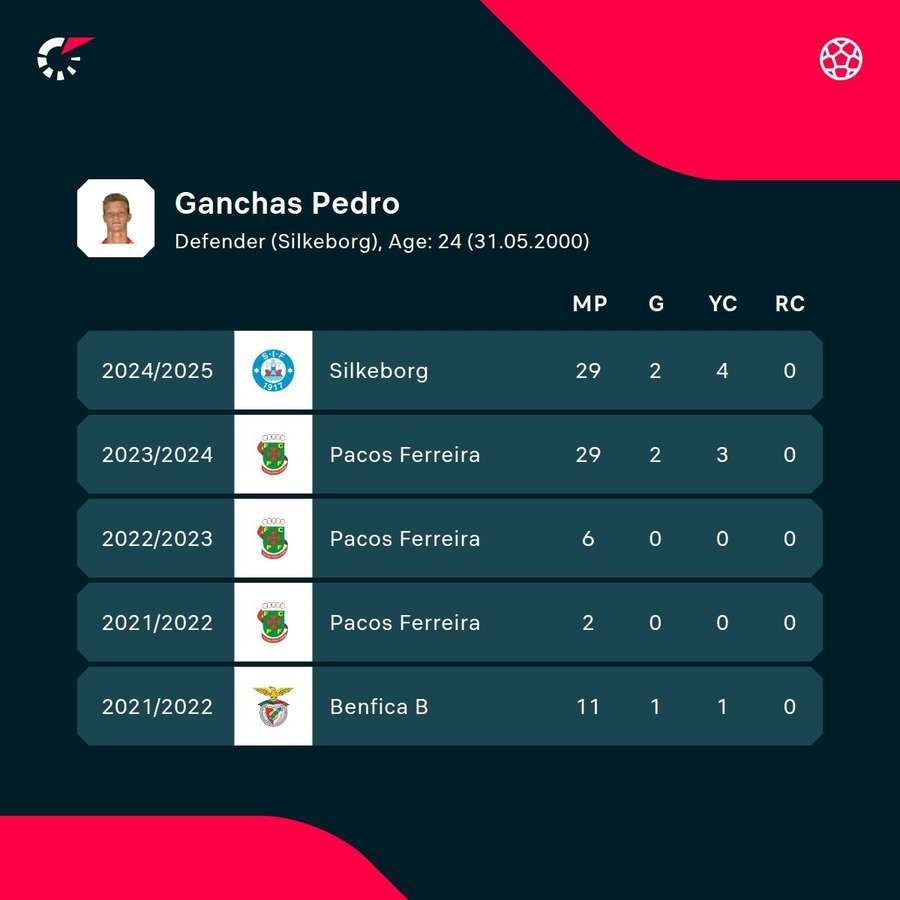Pedro Ganchas is currently in his debut season with Danish club Silkeborg and has expressed his surprise at the high level of competition he has faced. In a conversation with Flashscore, the Portuguese defender also pointed out three young players he believes could attract international interest.
There are moments when self-reflection leads you to realise that sometimes, taking a step back is necessary to recalibrate your thoughts. That’s precisely what Pedro Ganchas experienced.
Following a four-year stint with Benfica, the defender chose not to renew his contract with the Eagles and returned to his roots at Carregado, where, over the next two years, he realised it wasn’t the ideal place for his future aspirations.
Fast forward, and he finds himself in Denmark, playing for Silkeborg in a league that has surprised him “considerably” in a positive manner.

Silkeborg
“I was quite taken aback upon arriving in Denmark”
– How has your experience been in Denmark?
“On a personal level, I can confidently say things are going very well. I had my reservations when I accepted the offer to move to Denmark, primarily because it isn’t a league that garners significant attention in Portugal and is somewhat peripheral in European football. Consequently, there was a degree of unfamiliarity and uncertainty. But I was quite taken aback upon my arrival.”
“Before the December break, our team was in the top six and reached the semi-finals of the Cup. I had featured in every game, so the outlook was promising. However, upon resuming competition in February, we faced difficulties and slipped out of the top six.”
“Since then, we’ve been striving to regain our footing, with our current goal to secure 7th place, which leads to a playoff for European competition. With about a month left in the season, I can say my overall assessment is quite positive—it has surpassed my expectations.”
– How would you evaluate the Danish league?
“The players here are primarily distinguished by their athleticism. Culturally, Danes are very active, even in the cold; they have a habit of cycling and running through forests, which is evident on the field, particularly in the intensity of the games.”
“When Portugal recently faced Denmark, this was especially noticeable, particularly during the initial match. From a tactical and methodological standpoint, we Portuguese are perhaps among the best worldwide, and I’ve noticed there’s less emphasis on these details here. The game tends to be quicker and more fragmented, leading to numerous scoring opportunities, which injects a lot of excitement into the matches.”

Flashscore
– In what ways has your game as a defender been influenced?
“Developing my skills to meet game demands has been crucial.”
– The Danes are often perceived as reserved. Do you agree with this view?
“Yes, they are generally more reserved, possibly influenced by the climate. For much of the year, the weather is rather cold, which may discourage venturing outside both for Danes and for us Portuguese. It leads to a preference for family-oriented indoor activities.”
“However, when it comes to interpersonal relationships, they are notably open and eager to assist. The staff and my teammates have been exceptional, making my transition smooth. Socialising outside the club context can be a bit challenging, but this is expected given the cultural differences.”
– What drew you to Silkeborg and how would you characterise the club?
“That was one of the factors that made me ponder: why me, a Portuguese? Aside from the Swede next door, there are only two foreigners on the team. It’s not a club that typically has a strong inclination to recruit international players, which made me question their interest in investing in a Portuguese player.”
“Another concern was the synthetic pitch. I hadn’t played on artificial turf since I was 17, and that worried me. However, those apprehensions quickly faded once I arrived. I encountered no issues at all.”
“The club genuinely surprised me with its professionalism. They have a serious approach, a clearly defined strategy, and it’s evident they are adhering to this plan consistently. They have achieved success in developing players and managing profitable sales—an impressive accomplishment for a league of this stature. The financial aspect, coupled with their ability to cultivate talent, is commendably managed.”
– Recent departures like Oliver Sonne to Burnley, newly promoted to the Premier League, confirm that attention is being drawn to the Danish league.
“Football is becoming increasingly globalised and recognising talent wherever it exists. Over recent years, the Danish league has gained visibility, largely due to the successful transfers it has facilitated. The top five leagues are now paying more attention to Denmark’s league.”
– How are footballers perceived in Denmark?
“In Denmark, players aren’t idolised in the same manner as they are in Portugal. In Portugal, players often enjoy hero status, whereas here, it’s different. I find it challenging to gauge the expectations from fans, the coach, and the club; however, judging by my performance so far, I feel I have met those expectations.”
– What’s life like for you in Silkeborg?
“I’m quite a reserved individual, not one to indulge in excessive adventures or luxuries. Silkeborg is a peaceful and beautiful town. The only downside is the logistical aspect – the nearest airport is an hour away, and I require a stopover to return home. It’s a nature-encircled locale. While I miss the beach and the cuisine, my life here isn’t bad at all.”
– What do you hope this opportunity will lead to in the future?
“Leaving Portugal was about seeking experience abroad, without a firm understanding of international football. Now that I’m here, as the season winds down, I have personal objectives, such as elevating my career to new heights. The examples we observe around us affirm the belief that greater opportunities may arise. Without undermining my current club, every footballer aspires to achieve more. I aim to continue climbing the ladder in the future.”

Silkeborg
The Next Harder or Schjelderup: “There’s a Talented Kid from Copenhagen…”
– With players like Gyökeres, Hjulmand, Harder, Dahl, and Scheljderup, are you surprised about the increasing interest Portuguese football has in the Nordic market?
“Beyond their physicality, I’ve been impressed by their technical ability. I didn’t expect it to be this high. Portugal has a reputation for producing technically gifted players, so I’m not surprised by the growing interest in the Nordic leagues. The essential factors for succeeding in bigger leagues are tactical adaptability and lifestyle.”
– Do you see another Harder or Hjulmand out there who could be a consideration for a Portuguese club?
“It’s challenging to pinpoint names because, for instance, Hjulmand was with Lecce, and Gyökeres played in the Championship. Both left their countries at a young age and had different experiences before making their way to larger clubs. In the case of Harder and Scheljderup, the transitions were quite significant. It’s difficult to specify names due to many factors, such as their age and what they’ve already demonstrated in their respective teams.”
“However, I can mention one or two talents… There’s a promising player from Copenhagen, Victor Froholdt, who has already been called up to the senior squad. There’s also a young prospect from Aalborg, Melker Widell, and another player from Lyngby, Peter Langhoff, who wears number 22. These youngsters have significant potential, but predicting their futures is a challenge as it all depends on the clubs’ plans and how they wish to aid their development.”
– What about the fans? Do you experience a different phenomenon in Denmark?
“There’s a stark contrast with Portugal. In Portugal, allegiance mainly lies with the prominent clubs, making it rare to encounter a fan who solely supports a smaller club like Estoril and not a larger one. That isn’t the case here. The competition is intense, and people show a lot of loyalty to their local clubs. There’s a more humanistic aspect, marked by respect. The Silkeborg stadium accommodates 10,000, and we regularly draw 7,000 to 8,000 fans—a notably high attendance. Each stadium has a strong football culture. Even when facing teams at the bottom of the table, there’s a palpable excitement around football.”
– The next match is against Brøndby in the semi-finals of the Cup. Do you believe reaching the final and contending for the trophy is achievable?
“Absolutely. Silkeborg won the Cup last year, and we certainly have the potential to reach the final. It’s a two-legged tie, with the second leg hosted at our ground, so there’s plenty of optimism. Brøndby is a formidable club on the rise, but if we execute our game plan effectively, I believe we can secure a spot in the final.”

SL Benfica
– Your decision to leave Benfica reflects a great deal of maturity. When did you realise you could pursue a career in professional football?
“There were two phases to this realisation. Initially, when I left, many were puzzled by my choice. I was in a position most aspired to, and they questioned why I would opt to give that up. At that point, I wasn’t content, and I have no regrets. It was the right call. Then there was a subsequent phase, where I returned to square one and realised that this wasn’t where I wanted to be, and I aspired to reach a different level. It was a shift in mindset as I had to identify what was necessary to return to that level. Those two years were pivotal for me. Upon my return to Benfica, I was already on a professional contract, and my perspective had changed significantly.”
“I would say it was in my second year as an Under-23 that I genuinely began to believe that I could carve out a career in football. I felt things were progressing positively and I could potentially step up to the B team. There’s always a hint of disappointment that I didn’t break into the A team, but at that time, opportunities were scarce.”

Silkeborg
“I don’t anticipate returning to Portugal in the near future”
– Since relocating to Denmark, has your perspective on Portuguese football shifted significantly?
“My perception hasn’t changed. Portugal still plays high-quality football. Perhaps we lack some of the intensity I’ve encountered here. For instance, Silkeborg plays to win, even when travelling to Copenhagen, while in Portugal, some teams appear content to play for a draw, embracing a solid defensive setup. This isn’t as common here, making games more appealing for spectators. I continue to appreciate and follow Portuguese football while recognising there is always room for improvement.”
– Do you contemplate returning to Portugal?
“As it stands, I don’t envision returning to Portugal in the near future unless it’s with one of the top clubs. I’m not ruling it out completely, but it would need to be a well-supported project. I’d prefer to extend my footballing experience abroad.”
– Pedro, what would you hope people say about you once you’ll hang up your boots?
“Most importantly, I would like to be remembered as a person within football. It’s a highly competitive domain with a multitude of factors at play. Ultimately, I wish to be acknowledged as a professional who respected everyone, achieved his goals based on merit and work ethic. If people could say I was an exceptional player with a beautiful career built through professionalism and dedication, that would leave me with peace of mind and a clear conscience.”
Compiled by SportArena.com.au.
Fanpage: SportArena.com.au.
LiveScore – Live Sports Results & Odds.




